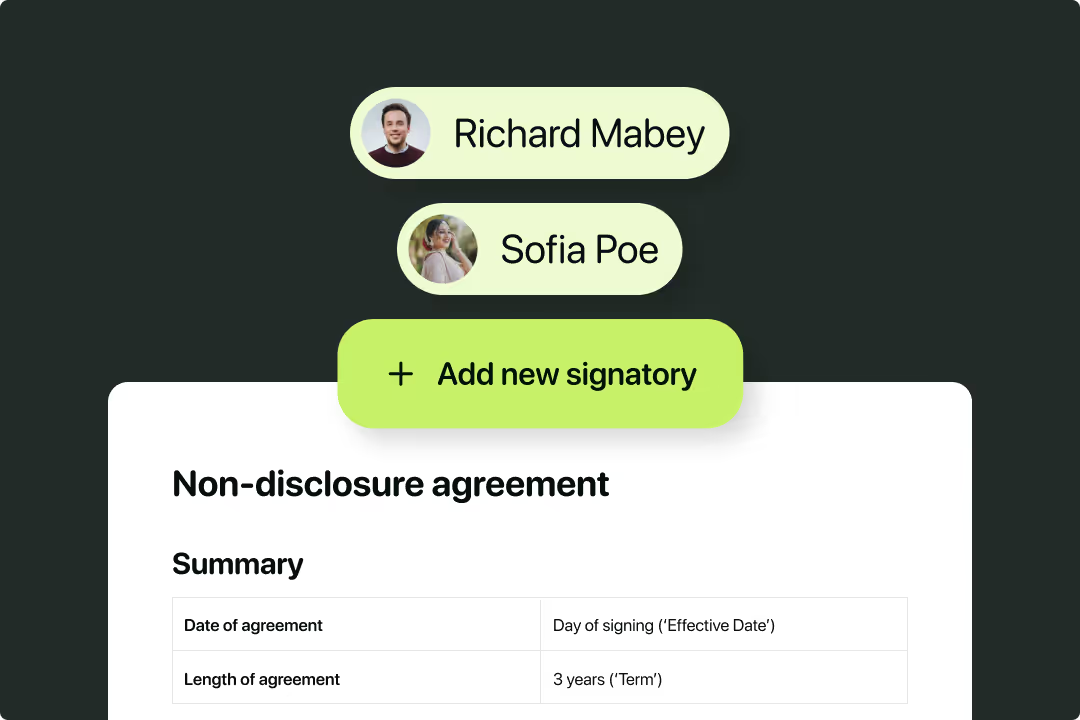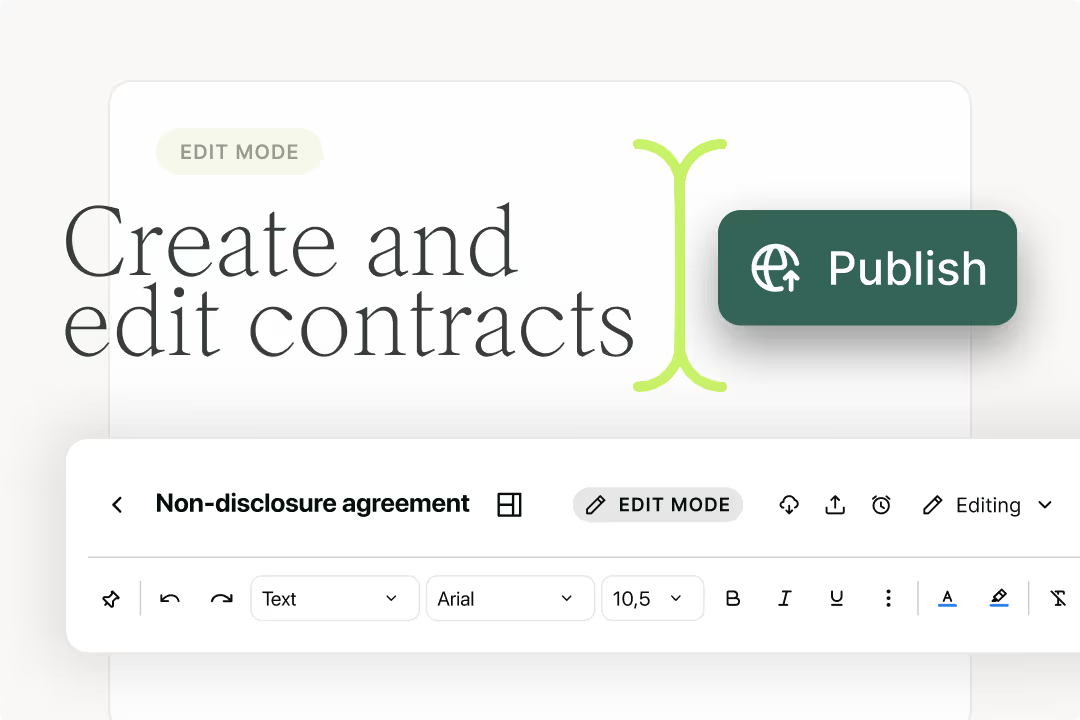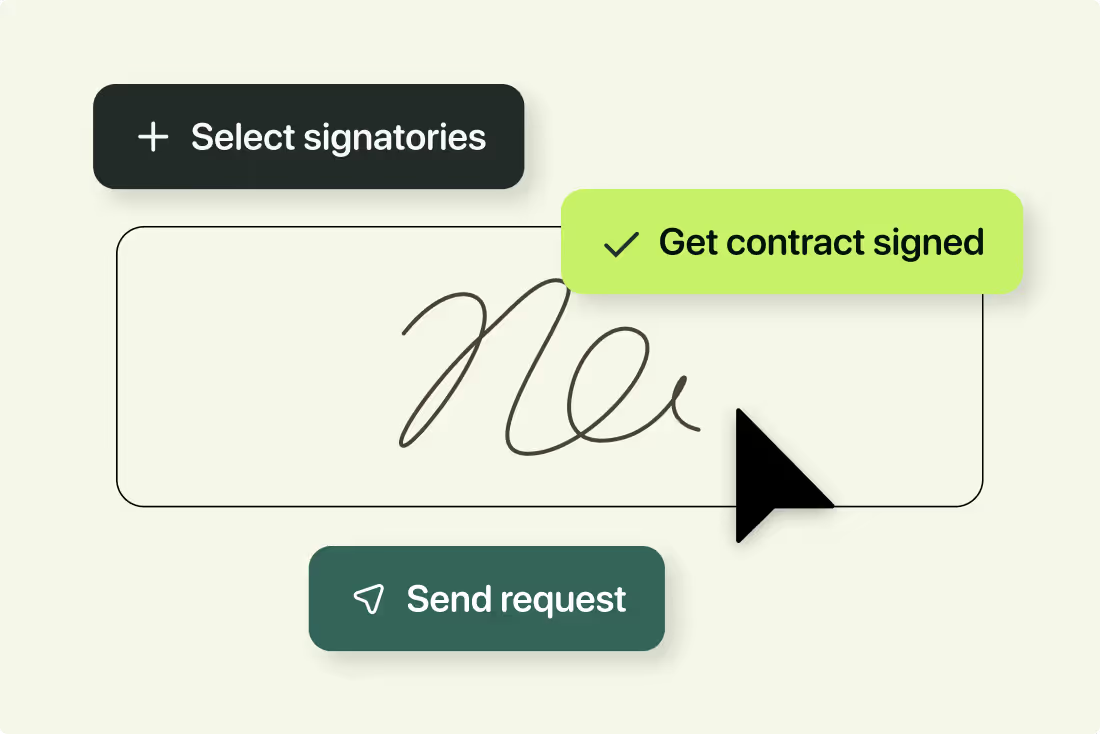Solutions
Customer Support
Resources
Commercial contracts are a sign of success, and fast-growing businesses will be entering into commercial contracts often. The problem is, the more there are, the more difficult managing them becomes.
This Juro deep-dive explores everything you need to know about commercial contracts, from what they are to what they should include and how you can best manage them.
If you're experiencing blockers and bottlenecks when managing commercial contracts, hit the button below to find out how Juro can help. Otherwise, read on to find out more about commercial contracts.

A commercial contract is a legally binding agreement between two or more businesses that are engaging in a transaction of some sort.
Another way to look at commercial contracts is as agreements used to govern a commercial activity. Commercial activity can include things like:
Either way, the purpose of a commercial contract is to govern the transactions that take place between these businesses and ensure that all of the parties are keeping to the promises they made to each other.
Like business contracts, commercial contracts are essential to a company’s growth and success. After all, commercial contracts are typically used to formalize new relationships or opportunities. If you’re signing an increasing number of commercial contracts, the chances are your company is scaling, and fast.
But commercial contracts are also particularly important since commercial transactions tend to have a higher value than consumer ones. With these larger, higher-value transactions, there is naturally more contract risk, and potential losses for non-compliance are often far greater.

Commercial contracts can often be used to reduce this risk and establish clear expectations for each party. They also help to ensure that these expectations can be enforced, which provides businesses with much-needed legal protection.
Commercial contracts are also important for tracking purposes, too. Businesses tend to be involved in lots of transactions - and on a regular basis. Without contracts in place, there would be no way to manage these obligations, and ensuring contract compliance would be near impossible.
But when commercial contracts (and the obligations within them) are managed properly with the right contract management software, monitoring contracts is made simple.
What many people also forget is the role that commercial contracts play in making businesses appear more professional, too. By drafting a contract to confirm a deal, you demonstrate that you’re serious about working with the other business and that you’re willing to be held accountable for any breach of contract on your part. This can go a long way.
The rules on when a commercial contract becomes legally binding are the same as the rules for most types of contracts. In order to be legally enforceable, commercial contracts in the UK must include the following elements of a contract:
The rules are the same within the US, except there are two additional criteria that commercial contracts must meet:
Now we know what’s required to make a commercial contract to be legally binding. But what should a commercial contract actually include? Let’s discuss that next.

All commercial contracts are different, so it’s impossible to provide a definitive list of what every commercial contract should include. That said, there are a few elements that will be included in almost every commercial contract. Let’s run through these together now.
All commercial contracts should begin by outlining who the parties to the contract are. This is important since it clarifies which parties will bear responsibility for different obligations, and who needs to consent to the contract’s terms for it to become effective.
Perhaps most importantly of all, a commercial contract needs to discuss deliverables. In other words, the contract needs to describe exactly what each party is promising to do for the other, and how they will fulfil these obligations.
Just as it’s important for a commercial contract to discuss the obligations parties have, it’s also important for a contract to explain how these obligations can be discharged.
Don’t stress if you’re not clued up on what this means just yet. We’ve written a detailed guide on how to discharge of a contract to help you out.
A commercial contract usually also includes information about what happens if a party fails to perform their contractual obligations. This is also known as breaching a contract.
This section of a commercial contract will usually discuss what action parties can take in the event of a breach, and what damages can be awarded - if any.
Since commercial contracts tend to have a high value, it’s extremely common for them to include clauses that impose limits on potential liability. By seeking to exclude or limit liability, businesses can protect themselves from being held liable for certain eventualities, or reduce the amount that they may be required to pay out if they are found liable.
Be careful using these exclusion and limitation clauses, though. There are plenty of rules on when and how they can be used. To find out more about these rules, check out the Unfair Contract Terms Act 1977.
With a lot of commercial transactions happening across borders, it’s increasingly important for the contract to specify which jurisdictions laws will be used to govern the contract. This is important since different countries have different laws.
Without clarity on which of these laws will apply, businesses will often find themselves confused and without sufficient legal protection.
Even once you know what to include within them, managing commercial contracts is no easy feat. In fact, commercial contracts are particularly difficult to manage, and there’s a few reasons for this.

One of the most common problems with commercial contracts is that a successful business tends to handle a lot of them. As we mentioned at the start of this post, increasing contract volumes are a sign of growth, and growth is good.
However, most scaling companies have lean legal teams, making it challenging to keep up with these contracts and get contracts signed quickly.
As sales teams know all too well, delays in the contracting process can result in lost opportunities and subsequently, less revenue capture.
"Most scaling companies have lean legal teams, making it challenging to keep up with these contracts and get contracts signed quickly"
Of course, there is the option of leaving commercial teams to create contracts independently of the legal department. But commercial contracts tend can be high-risk, and removing legal oversight will only exacerbate this risk.
Where does this leave businesses, though? Well, it’s possible for legal to maintain oversight over commercial contracts without being wholly responsible for them. This can be done by enabling commercial teams to self-serve on contracts, rather than just leaving them to work in silos.
Using contract automation software like Juro, legal teams can create automated contract templates for business teams to populate. They can also bake fallback clauses into contracts using conditional logic rules.
Features like conditional logic enable legal teams to automatically include a specific clause within a contract when certain conditions are met, like if a contract has a certain value, or is governed under a certain jurisdiction.
Thanks to these features, Juro enables legal teams to retain control over contracts and scale contracts without scaling headcount.

Like most contracts, commercial contracts require a lot of administrative work.
A traditional contract workflow involves switching between tools to draft, review, share and negotiate contracts. Not only is this time-consuming, but it also means lots of manual data entry and back and forth. And that’s just during the pre-signature phase of the contract lifecycle. This work only continues post-signature.
Since many commercial contracts are also standardized contracts, like NDAs, MSAs, DPAs and vendor agreements, this work tends to be repetitive and low-value. This low value work distracts legal teams from higher value work that ought to be a bigger priority.
It’s clear from the problems we just described that managing commercial contracts is particularly difficult for fast-growing companies with lean legal teams. But it doesn’t have to be.
Juro’s all-in-one contract automation software was designed to help businesses automate and manage contracts at scale. The software enables scaling companies to do this in a few different ways.
Juro’s template builder makes it quick and easy for legal teams to create beautifully designed contract templates. These dynamic templates can be created without writing a single line of code.
These automated contract templates can then be accessed by business teams in need of commercial contracts, and they can be populated in seconds either by using Juro’s simple questionnaire or by integrating Juro with a business tool of your choice.

Juro users can also ensure that contracts are watertight by setting up contract approval workflows. These are designed to ensure that contracts never fall through the cracks, and that they receive the necessary approval before being sent out to counterparties.
In Juro, there are a few ways to customize these approval workflows. One way to do this is by setting up an approval workflow when certain conditions are met.
For example, Juro users can set up contract templates so that certain approval is automatically required when a contract has a certain value, or where the counterparty is based in a certain jurisdiction.
Juro users can also set up approval workflow sequences, meaning that different stakeholders must approve the contract in a certain order before it can progress.
This is an effective way to collaborate effectively with different departments but also to ensure that business teams can self-serve on contracts whilst also reducing contract risk.
A typical contract negotiation involves moving contracts back and forth between Word, email and shared drives in order to negotiate them. This creates friction and makes it difficult to track the progress of contract negotiations, as there’s no visibility into who has viewed the contract, which edits they’ve made, or which version of a contract is being redlined.
Juro solves all of these problems. Juro enables users to negotiate contracts without ever needing to leave the platform. Contracts can be redlined in the same tool they were created in, and users can tag certain clauses with comments, add redlines and discuss specific terms in more detail using comment threads.
Once negotiated, contracts can also be sent for signing using Juro.
Without an end-to-end solution like Juro, businesses will often need to rely on a separate electronic signature tool for this, like DocuSign, or a DocuSign alternative.
However, Juro’s native eSignature feature means that commercial contracts can be signed without needing to leave the platform, as Juro offers Advanced Electronic Signatures and is compatible with a wide range of devices.

Without a tool like Juro in place, commercial contracts tend to be scattered across shared drives and email chains. This makes it difficult - if not impossible - to find contracts when you need them, and to track the obligations within them.
Juro’s data-rich contract repository changes that. Juro users can use OCR search functionality to quickly search for specific terms, characters, parties or numbers within contracts to find the right contract and version.
They can also track data and obligations with ease since Juro automatically captures contract data and displays it in a customizable contract dashboard.
This makes monitoring contracts effortless, and it also reduces the time otherwise spent trying to manually input contract data into excel spreadsheets for contract management.
Juro users also have access to automated contract reminders, making it easy to stay on top of contract obligations and avoid missing upcoming deadlines. These automated reminders are an effective way to ensure contract compliance and avoid unwanted contract renewals.
If managing commercial contracts is painful for your business, it could be time for you to join the 6,000 companies already using Juro to power their contracts. Fill in the form below to find out more.
Lorem ipsum dolor sit amet, consectetur adipiscing elit. Suspendisse varius enim in eros elementum tristique. Duis cursus, mi quis viverra ornare, eros dolor interdum nulla, ut commodo diam libero vitae erat. Aenean faucibus nibh et justo cursus id rutrum lorem imperdiet. Nunc ut sem vitae risus tristique posuere.

